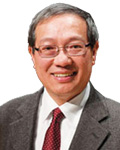|

Teng-Kee Tan, Dean of the Henry W. Bloch School of Management at the University of Missouri—Kansas City: I am concerned with the sustainability factor in our collaboration. We always talk about top institutions like Tsinghua and Peking universities, but the majority of Chinese students cannot get access to such elite universities. I am concerned about people living in the villages or in the second- and third-tier cities in China.
I think that teacher training is the way to resolve the problem. I know that the Chinese Government is encouraging about 5 percent of its students to study abroad, but still 95 percent of students will have no access to our education. So teacher training might be an effective way to address the lack of high-quality educational institutions in China.
I remember as a child I read the history of China. During the Tang Dynasty (618-907) and the Northern Song Dynasty (960-1127), top Korean and Japanese talent were sent to China to study the arts, literature, law and technology because China topped the world in science and technology at the time. Although at present Chinese students studying abroad outnumber foreign students studying in China, I think it is equally important for us to learn from China as it is for Chinese students to learn from us. China has things we don't really know about in the West. For example, we are completely ignorant of Chinese medicine and the integration of Chinese and Western medicine.
As the dean of the business school, I will tell you that my students are extremely interested in how multinational firms like Coca-Cola, General Motors and BMW differ in management and people strategy when conducting business in China. We know that General Motors sells more cars in China than they do in America. But not many people know how it recreates such a success in China. So if China's universities would package the type of knowledge that we are ignorant about, you will attract more students from across the world to come to China to learn.

Leo Morton, Chancellor of the University of Missouri-Kansas City (UMKC): UMKC is trying to stimulate "brain circulation." Last year, we had 68 students study in China, up significantly over prior years. At this point, we have over 300 students from China on our campus, which is up from only about 200 a couple of years ago. The UMKC academic program overseas provides scholarship for UMKC students studying in China and Chinese students studying at UMKC. The scholarship is offered by a UMKC professor to support the U.S.-China partnership in education. UMKC would like to attract 300 more students from China. We have very specific areas. We would like to see them be part, primarily engineering, science and management.
We would like to broaden our programs by reaching younger students and increasing participation among community colleges. The U.S.-China Fulbright Program has included more than 3,000 American and Chinese students and scholars today. The Chinese Government is strongly supporting this initiative and has already committed 10,000 scholarships for American high school and college students, teachers and school administrators to study in China. This is strong indication that we need to learn in both directions. This initiative seems to prepare the next generation of American experts on China, who will be charged with managing and growing political, economic and cultural ties between the two countries.
The real driver is going to be the American businesses which need to be more global. They will request American students to receive the global education that will allow them to advance and be successful. We also need to focus on the sciences. There is a lot the United States can learn from China in this area. We are seeking to strengthen bilateral science and technology relationships using the people-to-people versus the government-to-government approach here. We have offices at the provincial education departments of Jiangsu and Fujian provinces to recruit the best students to come to study at the UMKC. We also have MOUs with Nanjing University and Xiamen University for graduate programs. We also started a Youth Scientist Forum that promotes interactions between young U.S. and Chinese researchers using exchange programs and innovated technological platforms. It facilitates discussion on topics including research integrity, scientific responsibility and peer review processes.
I believe our future together looks bright. I believe we will deepen our relationships and understanding through these efforts.
Email us at: yanwei@bjreview.com | 